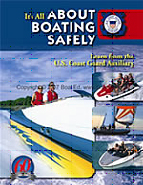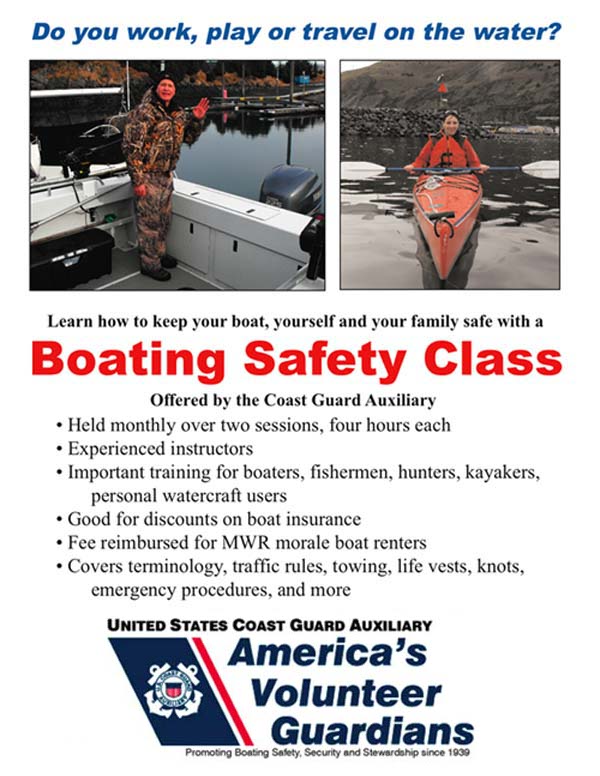The Kodiak CG Auxiliary is now offering
About Boating Safely Classes.
|
 |

The ABS class covers the basics of boating safety (see list of topics covered, below). This 8-hour class is a valuable tool for all recreational boaters in view of the fact that 63% of all boating accidents are caused by human error.The current cost for the ABS class is $50 which includes the course materials. If you are a member of the Coast Guard Auxiliary, you will receive a discount on the cost of the class. For those eligible to rent boats from the Morale, Welfare and Recreation boat house, the Kodiak MWR requires the ABS certification before renting a boat and will deduct the cost of the class from your first boat rental. Classes are taught by certified instructors
To send an email, requesting a class schedule or other information, click here.
Please put "ABS Class" in the subject line.
ABOUT BOATING SAFELY - MULTIPLE SESSIONS
If you are interested in an exciting, in-depth boating safety course, check out the multi-session classroom version of our popular online boating course.
This beginner boating class will give you the knowledge needed to obtain a boat license or safety certification in many states. Many boat insurance companies will offer discounts on boating insurance to boaters who successfully complete About Boating Safely.
TOPICS INCLUDE
-
Introduction to Boating - Types of power boats; sailboats; outboards; paddle boats; houseboats; different uses of boats; various power boating engines; jet drives; family boating basics.
-
Boating Law - Boat registration; boating regulation; hull identification number; required boat safety equipment; operating safely and reporting accidents; protecting the marine environment; Federal boat law; state boating laws; personal watercraft requirements.
-
Boat Safety Equipment - Personal flotation devices ("life jackets"); fire extinguishers; sound-producing devices; visual-distress signals; dock lines and rope; first aid kit; anchors and anchor lines; other boating safety equipment.
-
Safe Boating - Bow riding; alcohol and drug abuse; entering, loading, and trimming a boat; fueling portable and permanent tanks; steering with a tiller and a wheel; docking, undocking and mooring; knots; filing a float plan; checking equipment, fuel, weather and tides; using charts; choosing and using an anchor; safe PWC handling; general water safety.
-
Navigation - The U.S. Aids to Navigation system; types of buoys and beacons; navigation rules (sometimes referred to as right-of-way rules); avoiding collisions; sound signals; PWC "tunnel vision."
-
Boating Problems - Hypothermia; boating accidents and rescues; man overboard recovery; capsizing; running aground; river hazards; strainers: emergency radio calls; engine problems; equipment failures; carbon monoxide (CO); other boating and PWC problems.
-
Trailering, Storing and Protecting Your Boat - Types of trailers; trailer brakes, lights, hitches, tires, and bearings; loading, balancing, and towing a trailer; towing (and backing) a trailer; boat launching and retrieving; boat storage and theft protection; launching, retrieving and storing a PWC.
-
Hunting and Fishing, Water-skiing and River Boating - Carrying hunting gear and weapons in a boat; fishing from a boat; water-skiing safety guidelines and hand signals; water-skiing with a PWC; navigating rivers, and other boating tips.
|

